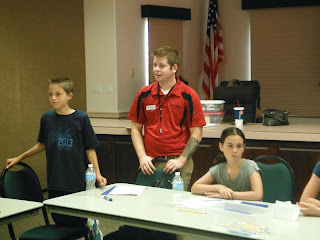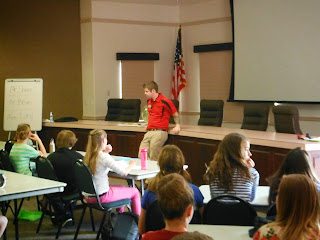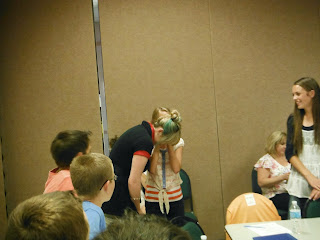Sunday, November 10, 2013
A Simple Understanding Can Make A Leader
This past September Shaun Wright, Lorelai Cantrell, and I were able to lead and participate in two workshops that changed the way we (or at least the way I) view the idea of what a leader is and can be. We were able to teach leadership skills to the student government students at both Cedar City Middle School and Canyon View Middle School, and hoped that the skills we taught them would not only make them better leaders but also help them to view themselves as leaders.
We decided early on that when we were able to teach these skills to students we would focus on middle school students. Shaun, Lorelai, and I felt that when people teach these sorts of lessons to students in the kindergarten to twelfth grade age bracket, they usually focus on high school students. We thought that not enough time is spent helping middle school students understand some of the key skills that make effective leaders, which can lead to many of the students who are involved in leadership positions at that age losing interest as they get older. With this view in mind we planned to make our lessons not only informative but easily understandable and above all, fun.
We decided to focus on the skills that we believed we used most often and that we represented the best, we settled on four; effective communication, delegation, organization, and time management. Personally I focused on effective communication and delegation, skills that I had used everyday as the Transfer Coordinator on the executive council of the Presidential Ambassadors at Southern Utah University last year. I tried to explain theses concepts in ways that were more relatable to sixth, seventh, and eighth graders. We played the telephone game and passed a message from one person to the next, making sure we whispered it so no one else could hear it. The first time we played the game we played with everyone (a large group) and the message that we finished with was in no ways the same as what we started with. I used the telephone game to show the middle school students that both communication and delegation are most effective when short lines of communication are used to relay a message from one person to another. Although; it seemed to the students that we were just playing a game, when we discussed what went wrong and how we can fix it they began to realize how important the use of short lines of communication can be.
Along with teaching the students a few skills that can help them be more effective as leaders we wanted to know what they thought a leader is, and asked them to give us some examples of leaders that they have noticed. The students were able to identify leaders on community, state, and national levels giving us examples such as their teachers, politicians they had seen on television, and President Obama. At the end of our lessons we asked them if they believed that they were also leaders, at first they didn’t seem to think so but as we reminded them of the positions they hold and of the skills that they are able to use in these positions they began to understand that they are leaders.
I believe that helping these middle school students understand that they are leaders and can become more effective and more influential if they continue to enhance their leadership skills, was more of an accomplishment than anything else we could have taught them. It was eye opening to gain an understanding of how others can use these skills to better themselves as leaders, and to see how much effect it can have on someone to view themselves as an influential person and a leader. I hope that these middle school students will not forget the things that we were able to teach them, and I know that personally I will not forget the things that they were able to help me realize.
Subscribe to:
Posts (Atom)




